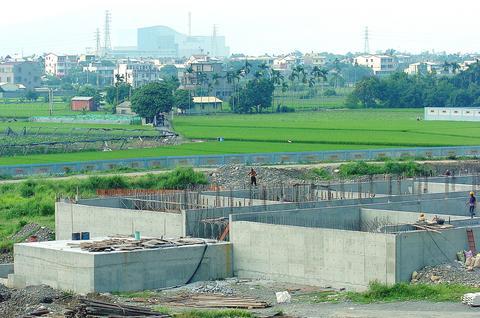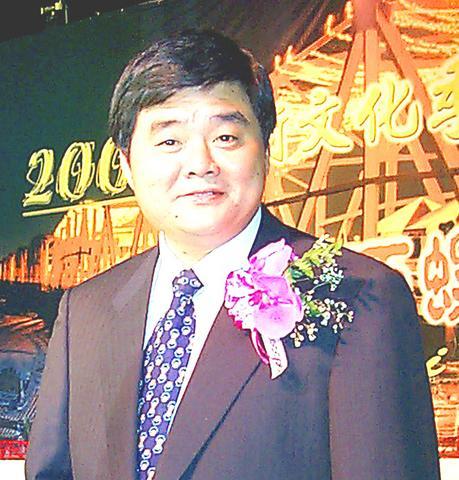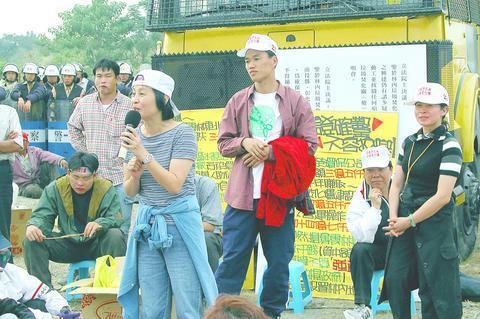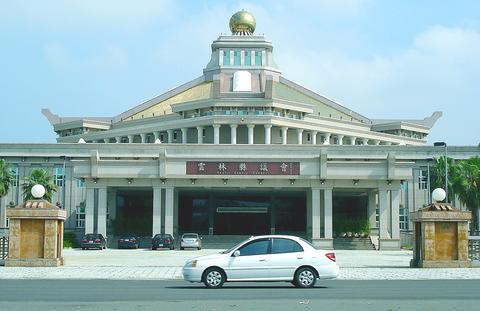Taiwan's agricultural backwater county of Yunlin is so poor that the county government still cannot afford to provide clean tap water for most of its 750,000 residents.
However, its county council didn't bat an eye when it poured NT$700 million into a grandiose council hall approved by its speaker Chang Jung-wei (

PHOTO: GEORGE TSORNG, TAIPEI TIMES
While Yunlin may lack clean drinking water, it has never been short of crime syndicates whose tentacles reach all over Taiwan, earning the county the popular moniker of "hometown of the mobsters."

PHOTO: TAIPEI TIMES
The county commissioner Chang, now in exile, has never denied his close relationship with the underworld community.
Throughout the period of single-party KMT rule in Taiwan until 2000, mobsters-turned-politicians learned every trick to siphon off huge amounts of government funds for local construction projects, such as new parks, schools or roads.

PHOTO: FILE PHOTO
Some of these dangerous criminals in disguise would advance step by step in their political careers from township representatives, to county councilpersons and all the way up to legislators. A few, like Chang, have even been elected county commissioners or city mayors.

PHOTO: FILE PHOTO
Fulbright scholar Chin Ko-lin (
Chang, a well-known syndicate member from Tuku, Yunlin, was born into a farming family. The young Chang in his early twenties was jailed for three years in a 1984 nationwide crackdown on gangsters. Upon his release from prison, he worked as an aide to Chen Shi-chang (陳錫章), a local underworld leader and former member of the Control Yuan (監察委員) under the KMT government.

FILE PHOTO
Another underworld "big brother" and former KMT legislator from Yunlin is Lin Ming-i (
By 1989, at the tender age of 28, Chang was elected county councilman for the first time and only months later ascended to the post of the county council speaker, mainly courtesy of Chen's behind-the-scenes maneuvering.
Until last month, Chang, a KMT member when not at odds with the party leadership, enjoyed superb popularity both in the political arena and underworld community in Yunlin. He was even addressed as "King of central Taiwan" (中部王) when he was elected county commissioner in 1999, in a poll that adversaries said was marred by outrageous vote-rigging and intimidation.
Nevertheless, Chang shot himself in the foot in November 2000 when he pushed through a project to build an incinerator in Linnei Township (
Female legislator Su Chi-fen (
Another notable leading figure is county councilwoman Yin Ling-ying (
Chang backed down from the project under intense international pressure against the development scheme. Had the project gone through, Chang could have reaped huge profits since his wife owned part of the hill.
Yin said she made two previous attempts to take the incinerator case to court, but to no avail. She was lucky this time in that she was able to show the prosecutor the operational plan of the incinerator listing various enormously bloated expenses.
For example, Su and Yin convinced the prosecutor to make a calculation of total construction cost for the project. The calculated figure indicated an exceess cost of more than NT$1 billion under items proposed by the county government.
The prosecutor's office was also puzzled by other unusual and, perhaps, unfair business practices in the plan. Under questioning, Linnei Township magistrate Chen Ho-shan (
According to reports, cash transaction records in Chen's bank account traced back the sum of money that was, in fact, related to a land-purchase fund of more than NT$200 million already paid by the county government. The land owner, however, told the prosecutor he had been paid a total of NT$100 million for the land. About NT$90 million was missing from the county fund and the prosecutor would like commissioner Chang to answer related questions.
Before the court order was served to the commissioner's office, Chang left his office and home on Aug. 14 and remains missing. He has given exclusive interviews to two local newspapers either in person or by phone at unknown locations not far from Yunlin County on different days.
As expected, Chang denied all the charges against him and claimed he was the victim of political persecution by the present administration for the reason that he openly supported the Lien-Soong ticket of the pan-blue camp during the March presidential election.
Yin and Su have both recently received death threats from Chang. At least one Yunlin councilman has been on TV to expose an "intimate relationship of holding hands and drinking coffee together" between Legislator Su and the prosecutor working on Chang's case to defame the women.
However, Yin and Su are standing strong. Commenting on Chang, Yin said: "It may simply be too difficult for Chang to realize that there are people in this world who do not care much about personal gains. Chang grew up in a world where brutal violence and personal profit surpass every bit of human value. He may win praise from gangsters who have been blessed with his personal favors. Su and I are just the type who refuse to trade public trust for personal favors or threats."
One elder Yunlin resident made a sharp observation about Chang's disappearance: "Well, Chang accumulated most of his personal wealth from illegally selling sand and gravel dug from the Chuoshui River (

A vaccine to fight dementia? It turns out there may already be one — shots that prevent painful shingles also appear to protect aging brains. A new study found shingles vaccination cut older adults’ risk of developing dementia over the next seven years by 20 percent. The research, published Wednesday in the journal Nature, is part of growing understanding about how many factors influence brain health as we age — and what we can do about it. “It’s a very robust finding,” said lead researcher Pascal Geldsetzer of Stanford University. And “women seem to benefit more,” important as they’re at higher risk of

March 31 to April 6 On May 13, 1950, National Taiwan University Hospital otolaryngologist Su You-peng (蘇友鵬) was summoned to the director’s office. He thought someone had complained about him practicing the violin at night, but when he entered the room, he knew something was terribly wrong. He saw several burly men who appeared to be government secret agents, and three other resident doctors: internist Hsu Chiang (許強), dermatologist Hu Pao-chen (胡寶珍) and ophthalmologist Hu Hsin-lin (胡鑫麟). They were handcuffed, herded onto two jeeps and taken to the Secrecy Bureau (保密局) for questioning. Su was still in his doctor’s robes at

Last week the Democratic Progressive Party (DPP) said that the budget cuts voted for by the China-aligned parties in the legislature, are intended to force the DPP to hike electricity rates. The public would then blame it for the rate hike. It’s fairly clear that the first part of that is correct. Slashing the budget of state-run Taiwan Power Co (Taipower, 台電) is a move intended to cause discontent with the DPP when electricity rates go up. Taipower’s debt, NT$422.9 billion (US$12.78 billion), is one of the numerous permanent crises created by the nation’s construction-industrial state and the developmentalist mentality it

Experts say that the devastating earthquake in Myanmar on Friday was likely the strongest to hit the country in decades, with disaster modeling suggesting thousands could be dead. Automatic assessments from the US Geological Survey (USGS) said the shallow 7.7-magnitude quake northwest of the central Myanmar city of Sagaing triggered a red alert for shaking-related fatalities and economic losses. “High casualties and extensive damage are probable and the disaster is likely widespread,” it said, locating the epicentre near the central Myanmar city of Mandalay, home to more than a million people. Myanmar’s ruling junta said on Saturday morning that the number killed had